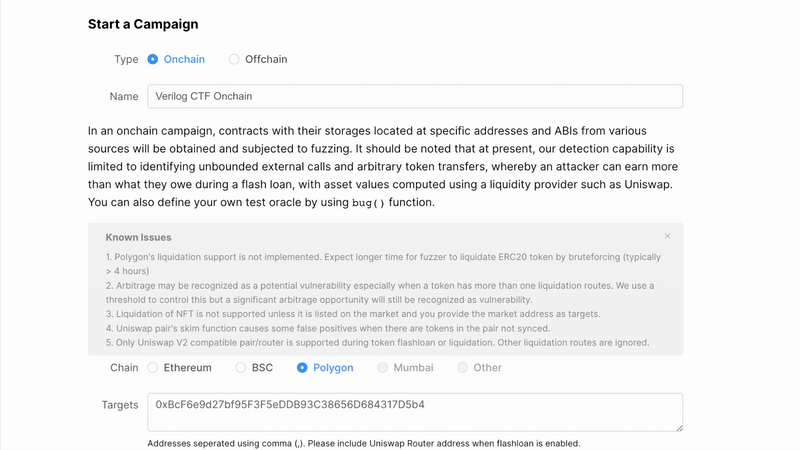Fast hybrid fuzzer for EVM & MoveVM (WIP) smart contracts.
You can generate exploits instantly by just providing the contract address:
中文版README / Research Paper / Development Info
Install Docker and run docker image suitable for your system architecture:
docker pull fuzzland/ityfuzz:stable
docker run -p 8000:8000 fuzzland/ityfuzz:stable
Then, you can visit the interface at http://localhost:8000
Note: The container uses public ETH RPC, may time out / be slow
Time taken for finding vulnerabilities / generating exploits:
| Project Name | Vulnerability | Mythril | SMARTIAN | Slither | ItyFuzz |
|---|---|---|---|---|---|
| AES | Business Logic | Inf | Unsupported | No | 4hrs |
| Carrot | Arbitrary External Call | 17s | 11s | Yes | 1s |
| Olympus | Access Control | 36s | Inf | Yes | 1s |
| MUMUG | Price Manipulation | Inf | Unsupported | No | 18hrs |
| Omni | Reentrancy | Inf | Unsupported | Yes* | 22hrs |
| Verilog CTF-2 | Reentrancy | Inf | Unsupported | Yes* | 3s |
* Slither only finds the reentrancy location, but not how to leverage reentrancy to trigger final buggy code. The output also contains significant amount of false positives.
Test Coverage:
| Dataset | SMARTIAN | Echidna | ItyFuzz |
|---|---|---|---|
| B1 | 97.1% | 47.1% | 99.2% |
| B2 | 86.2% | 82.9% | 95.4% |
| Tests | Unsupported | 52.9% | 100% |
* B1 and B2 contain 72 single-contract projects from SMARTIAN artifacts. Tests are the projects in tests directory. The coverage is calculated as (instruction covered) / (total instruction - dead code).
You need to have libssl-dev (OpenSSL) and libz3-dev (refer to Z3 Installation section for instruction) installed.
# download move dependencies
git submodule update --recursive --init
cd cli/
cargo build --releaseYou can enable certain debug gates in Cargo.toml
solc is needed for compiling smart contracts. You can use solc-select tool to manage the version of solc.
Compile Smart Contracts:
cd ./tests/multi-contract/
# include the library from ./solidity_utils for example
solc *.sol -o . --bin --abi --overwrite --base-path ../../Run Fuzzer:
# if cli binary exists
cd ./cli/
./cli -t '../tests/multi-contract/*'Verilog CTF Challenge 2
tests/verilog-2/
Flashloan attack + Reentrancy. The target is to reach line 34 in Bounty.sol.
Exact Exploit:
0. Borrow k MATIC such that k > balance() / 10
1. depositMATIC() with k MATIC
2. redeem(k * 1e18) -- reentrancy contract --> getBounty()
3. Return k MATIC
Use fuzzer to detect the vulnerability and generate the exploit (takes 0 - 200s):
# build contracts in tests/verilog-2/
solc *.sol -o . --bin --abi --overwrite --base-path ../../
# run fuzzer
./cli -f -t "./tests/verilog-2/*"-f flag enables automated flashloan, which hooks all ERC20 external calls and make any users to have infinite balance.
You can fuzz a project by providing a path to the project directory.
./cli -t '[DIR_PATH]/*'ItyFuzz would attempt to deploy all artifacts in the directory to a blockchain with no other smart contracts.
Specifically, the project directory should contain
a few [X].abi and [X].bin files. For example, to fuzz a contract named main.sol, you should
ensure main.abi and main.bin exist in the project directory.
The fuzzer will automatically detect the contracts in directory, the correlation between them (see tests/multi-contract),
and fuzz them.
Optionally, if ItyFuzz fails to infer the correlation between contracts, you
can add a [X].address, where [X] is the contract name, to specify the address of the contract.
Caveats:
-
Keep in mind that ItyFuzz is fuzzing on a clean blockchain, so you should ensure all related contracts (e.g., ERC20 token, Uniswap, etc.) are deployed to the blockchain before fuzzing.
-
You also need to overwrite all
constructor(...)in the smart contract to to make it have no function argument. ItyFuzz assumes constructors have no argument.
Rebuild with flashloan_v2 (only supported in onchain) enabled to get better result.
sed -i 's/\"default = [\"/\"default = [flashloan_v2,\"/g' ./Cargo.toml
cd ./cli/
cargo build --releaseTo effectively cache the costly RPC calls to blockchains, third-party APIs, and Etherscan, a proxy is built. To run the proxy:
pip3 install -r proxy/requirements.txt
python3 proxy/main.pyYou can fuzz a project by providing an address, a block, and a chain type.
./cli -o -t [TARGET_ADDR] --onchain-block-number [BLOCK] -c [CHAIN_TYPE] Example:
Fuzzing WETH contract (0xc02aaa39b223fe8d0a0e5c4f27ead9083c756cc2) on Ethereum mainnet at latest block.
./cli -o -t 0xc02aaa39b223fe8d0a0e5c4f27ead9083c756cc2 --onchain-block-number 0 -c ETHFuzzing with flashloan and oracles enabled:
./cli -o -t 0xc02aaa39b223fe8d0a0e5c4f27ead9083c756cc2 --onchain-block-number 0 -c ETH -f -i -pItyFuzz would pull the ABI of the contract from Etherscan and fuzz it. If ItyFuzz encounters an unknown slot in the memory, it would pull the slot from chain RPC. If ItyFuzz encounters calls to external unknown contract, it would pull the bytecode and ABI of that contract. If its ABI is not available, ItyFuzz would not send any transaction to that contract.
To use proxy, append --onchain-local-proxy-addr http://localhost:5003 to your CLI command.
ItyFuzz attempts to fetch storage from blockchain nodes when SLOAD is encountered and the target is uninitialized. There are three ways of fetching:
- OneByOne: fetch one slot at a time. This is the default mode. It is slow but never fails.
- All: fetch all slots at once using custom API
eth_getStorageAllon our nodes. This is the fastest mode, but it may fail if the contract is too large. - Dump: dump storage using debug API
debug_storageRangeAt. This only works for ETH (for now) and fails most of the time.
macOS
git clone https://github.com/Z3Prover/z3 && cd z3
python scripts/mk_make.py --prefix=/usr/local
cd build && make -j64 && sudo make installIf the build command still fails for not finding z3.h, do export Z3_SYS_Z3_HEADER=/usr/local/include/z3.h
Ubuntu
apt install libz3-devItyFuzz collects telemetry data to help us improve the fuzzer. The data is collected anonymously and is not used for any commercial purpose.
You can disable telemetry by setting NO_TELEMETRY=1 in your environment variable.
This work was supported in part by NSF grants CCF-1900968, CCF1908870, and CNS1817122 and SKY Lab industrial sponsors and affiliates Astronomer, Google, IBM, Intel, Lacework, Microsoft, Mohamed Bin Zayed University of Artificial Intelligence, Nexla, Samsung SDS, Uber, and VMware. Any opinions, findings, conclusions, or recommendations in this repo do not necessarily reflect the position or the policy of the sponsors.
Grants:
| Grants | Description |
|---|---|
 |
Grants from Sui Foundation for building Move and chain-specfic support |
 |
Grants from Web3 Foundation for building Substrate pallets and Ink! support |
